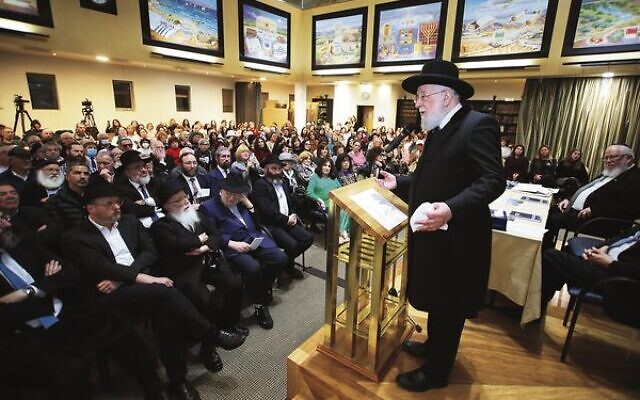‘We have to love each other’
Rabbi Lau, a child survivor, said his message – that Israel's common bonds of loss and grief transcend partisan divides and retributions – had moved the Rebbe to tears and he had responded to his visitor, "I understand."
SPEAKING to a capacity audience at Chabad House of Caulfield–770, Rabbi Yisrael Meir Lau, former Ashkenazi chief rabbi of Israel, used his address – Israel at 75: Today and Tomorrow – to urge unity among Jews, but appeared to downplay the importance of democracy in the Jewish state.
Rabbi Lau said the word “democracy” did not appear in Israel’s Declaration of Independence but the word “Yehudim [Jews]” appeared 19 times.
“Medinat Yehudim [the Jewish state] is the future, past and present of Israel. Another definition you will not find,” he declared.
“The problems in Israel about democracy … it’s politics … We will overcome them … it’s not a problem,” he asserted in his one-hour address on July 13 to an audience that included senior Melbourne rabbis and business magnate Rabbi Joseph Gutnick, who had brought him to Australia.
While not directly addressing the deep rifts in Israel over the proposed judicial overhaul that threatens to weaken the powers of the courts and strengthen the powers of the Knesset, the 86-year-old luminary emphasised timeless bonds between Israelis and between Jews. “We cannot predict the future but we know the past.”
Rabbi Lau told of a visit he made to the Lubavitcher Rebbe, Menachem Mendel Schneerson, soon after the 1973 Yom Kippur War. An election (postponed by the war) had been held, and the Rebbe wanted to know why a government that had left Israel unprepared for the surprise attack of Arab armies had won another term.
Responding to the Rebbe, Rabbi Lau had related the heartrending story of officiating at a wedding in the early days of the October war, 50 years ago. With 15 guests instead of the planned 250, a tearful bride, and a groom with five hours before reporting to his military post, he was approached by a distraught worker at the hall.
The Auschwitz survivor, whose husband had fallen in Israel’s War of Independence, swore to Rabbi Lau that if her son also died in battle, she did not intend to go on living.
Rabbi Lau, a child survivor, said his message – that Israel’s common bonds of loss and grief transcend partisan divides and retributions – had moved the Rebbe to tears and he had responded to his visitor, “I understand.”
Contrasting the handing down of the Torah at Sinai, an unconditional acceptance by the Jewish people, with attitudes to and within modern Israel, in which there is much prevarication over political and ideological issues, Rabbi Lau called on Jews to have greater faith in Israel.
“We are a very special nation. We have to love each other.”


comments